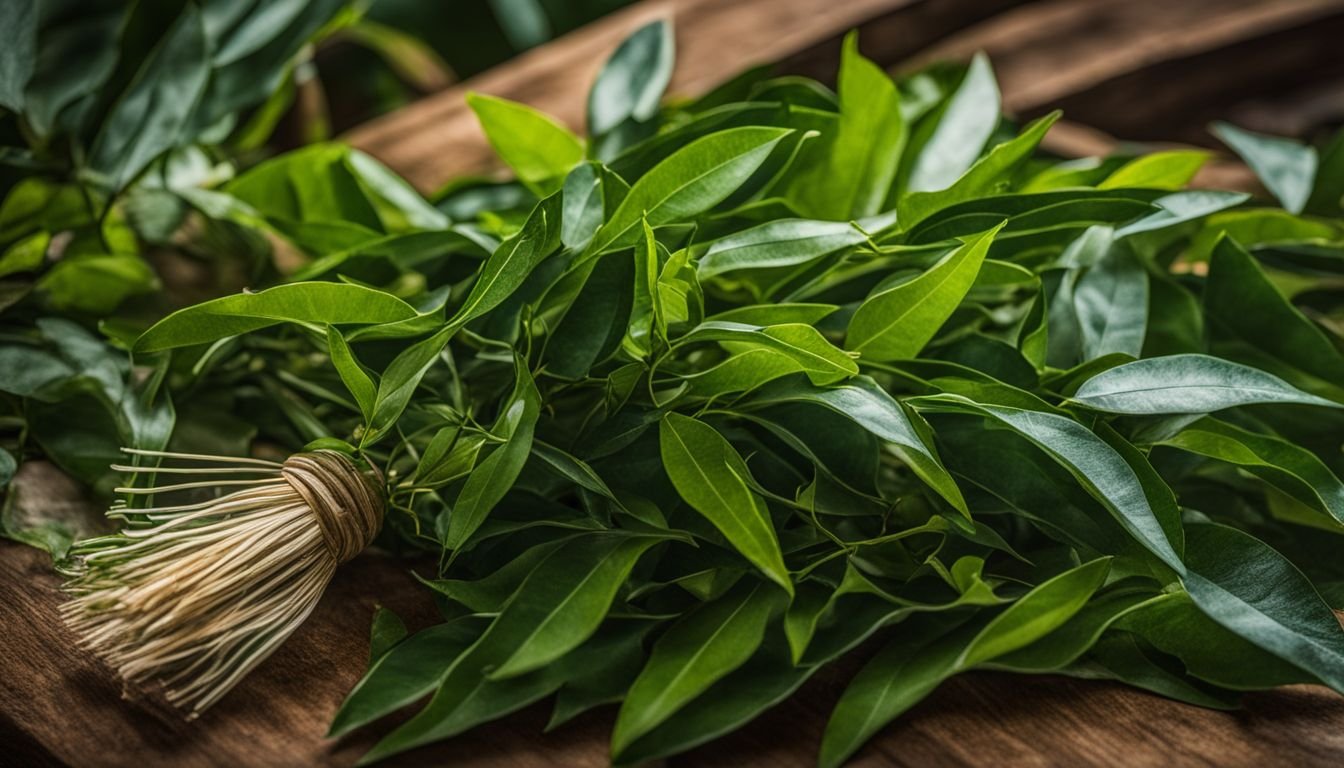Feeling under the weather can really put a dampener on your day. Enter Lemon Myrtle, an Australian native plant packed with surprising health perks. From soothing sore throats to boosting your immune system, this blog will reveal how Lemon Myrtle could be your new wellness ally.
Read on – it’s truly refreshing!
Key Takeaways
- Lemon Myrtle is an Australian plant full of health benefits, including antibacterial properties that help with respiratory issues like sinus infections and bronchitis.
- It supports digestive and oral health by fighting bacteria in the mouth and aiding digestion thanks to its essential nutrients such as zinc, calcium, and magnesium.
- The leaves are high in citral, vitamins A, E, C, antioxidants which boost the immune system and protect against oxidative stress caused by free radicals.
- Aside from health benefits, Lemon Myrtle’s versatility shines through in cooking for flavouring dishes or drinks and has applications in cosmetics due to its pleasant scent.
- While offering numerous advantages for wellbeing, it is crucial to use Lemon Myrtle safely. Essential oils should be diluted properly before use to avoid skin irritation.
What is Lemon Myrtle?

Lemon Myrtle, also known as Backhousia citriodora, thrives in the subtropical rainforests of central and southeastern Queensland. It boasts an exceptional fragrance reminiscent of lemons.
This plant is cherished not only for its sensory delight but also for its versatile uses ranging from culinary to therapeutic applications.
Every part of the Lemon Myrtle tree has a purpose. The leaves contain high levels of citral and are packed with antioxidants and essential nutrients like vitamins A, E, and C. Moreover, they’re rich in minerals such as zinc, calcium, and magnesium – all beneficial elements that support overall health.
Gardeners love the Lemon Myrtle tree for its attractive appearance whilst appreciating it as a natural source of beneficial compounds used in essential oils and herbal infusions.
Remarkable Health Benefits of Lemon Myrtle

Delving into the myriad of lemon myrtle’s virtues reveals a treasure trove of health-boosting attributes, with this native Australian botanical offering more than just its enticing aroma.
Discover how it extends beyond mere fragrance, promising to enhance wellbeing through its remarkable therapeutic properties.
Treats Sinus Infections and Bronchitis
Lemon Myrtle emerges as a breath of fresh air for those struggling with sinus infections and bronchitis. Its leaves, rich in antibacterial and antimicrobial properties, work wonders against the germs responsible for these respiratory woes.
Sipping on lemon myrtle tea can offer soothing relief. This caffeine-free beverage packs a zesty punch whilst helping clear congested airways.
Gardeners fond of Lemon Myrtle not only bask in its lovely smell but also reap medicinal benefits right from their back garden. Brewed into teas or used as an inhalant, it’s a natural remedy that supports lung health.
Harnessing the power of Lemon Myrtle could transform your garden into a haven for both beauty and healing—picture enjoying the serene view while sipping on tea that calms your coughs and sniffles away.
Aids in Digestion and Oral Health
Chewing on Lemon Myrtle leaves can work wonders for your digestive system. The plant boasts a cocktail of zinc, calcium, and magnesium — essential nutrients that smooth out digestion processes.
Imagine sipping on Lemon Myrtle tea; its delightful citrus taste not only freshens your breath but also fights off harmful bacteria in the mouth thanks to potent antibacterial properties.
Incorporating this bush tucker into your daily routine could mean fewer trips to the dentist. Its antimicrobial prowess makes it an excellent natural alternative for mouthwash, keeping those pesky oral infections at bay.
Trust in the ancient wisdom of Indigenous Australians who have harnessed Lemon Myrtle’s healing powers for generations — nurturing both gut health and sparking smiles with healthier teeth and gums.
Boosts Immune System and Antioxidant Properties
Lemon myrtle packs a powerful punch for your immune system, thanks to its abundance of vitamin C and antioxidants that work tirelessly to fend off colds and other ailments. This plant’s leaves are brimming with compounds like zinc and magnesium which play pivotal roles in bolstering our body’s natural defences.
Drinking a cup of lemon myrtle tea could be just the ticket to keeping those pesky germs at bay, especially as the colder months roll in.
Full of citral, vitamins A and E, these elements act as guardians against oxidative stress within our bodies, helping us stay one step ahead of free radicals. Adding lemon myrtle to your daily routine isn’t just a treat for your senses; it’s an investment in maintaining healthful vibrance year-round.
Enjoy this aromatic gem in foods or apply it topically through infused oils and skincare products—either way, you’ll harness its remarkable antioxidant properties.
Alleviates Headaches, Asthma, and Rheumatoid Arthritis
Finding natural relief for headaches can be a true game-changer, and that’s where the lemon-scented myrtle steps in. Packed with zinc, calcium, and magnesium, this remarkable plant may help manage these nagging pains.
The leaves of Lemon Myrtle possess so much goodness that many individuals seeking alternative therapies turn to it for its potential pain-relieving properties. A whiff of its fragrant oils during aromatherapy sessions often provides immediate comfort for those suffering from tension headaches.
People battling asthma or rheumatoid arthritis might find an ally in Lemon Myrtle as well. Its high concentration of vitamin C is a crucial support for immune function, offering some control over the inflammation associated with these conditions.
With consistent use, whether through tea infusions or application to the skin, Lemon Myrtle can become part of a holistic approach to managing symptoms daily. Next up are additional uses that continue to demonstrate just how versatile this sweet verbena tree truly is.
Additional Uses of Lemon Myrtle
- Lemon Myrtle leaves add a unique citrus flavour to cakes, biscuits and desserts, making them a popular choice for bakers looking to infuse a lemony zest into their creations.
- A refreshing addition to beverages, Lemon Myrtle can be infused into cocktails or used to flavour finger lime green tea for an aromatic twist.
- In the culinary world, chefs appreciate Lemon Myrtle for its ability to act as a food preservative, prolonging the freshness of baked goods and savoury dishes.
- Beyond cooking, this plant finds use in cosmetics, with its oil being a prized ingredient in natural deodorants and shampoos due to its pleasant scent and antibacterial properties.
- Aromatherapists incorporate Lemon Myrtle essential oils into their practice for relaxation benefits, leveraging its calming aroma.
- The antimicrobial qualities of Lemon Myrtle make it effective in home – made cleaning products like counter sprays and vinegar mixes, ensuring surfaces are not just clean but also smell fresh.
- Gardeners value Lemon Myrtle for its potential as a natural insect repellent; crushing the leaves can deter pests without harming plants or beneficial insects.
- Those interested in herbal medicine sometimes turn to Lemon Myrtle’s extracts for treating skin conditions such as acne and molluscum contagiosum.
Safety and Precautions When Using Lemon Myrtle
Exploring the myriad uses of Lemon Myrtle, from easing muscle cramps to adding zing in baking, brings us to an important aspect: using this wonder plant safely. While it offers many health benefits, the essential oil extracted from lemon myrtle must be respected for its potency.
Dilute it properly before use; a concentration exceeding 1% could potentially cause irritation or other adverse reactions. Remember that safety with essential oils is not only about dilution but also about exposure frequency and application sites.
Handle Lemon Myrtle with care if you’re planning to include it in your home remedies or culinary adventures. Consuming the leaves for their flavour is generally safe when used appropriately as a spice or tea ingredient.
However, those who are pregnant should exercise caution and seek advice from a healthcare provider before using any form of lemon myrtle as part of their diet or skin regimen given its strong antimicrobial properties.
Similarly, individuals who are immune-compromised may require guidance due to possible interactions between herbal compounds and existing medications or conditions.
Conclusion
Lemon Myrtle shines as a beacon of wellness, offering an impressive array of health benefits. Its natural bounty is waiting to enhance your life, from soothing coughs and colds to brightening up culinary delights.
Embrace the essence of Australia’s native wonder and let its lemony zest invigorate your body and palate. Unlocking the potential within these fragrant leaves could be your next step towards a more vibrant health journey.
Make Lemon Myrtle part of your daily routine and experience nature’s own remedy at work.
While lemon myrtle offers an array of health benefits, if you’re interested in exploring more about native plants, learn about the enchanting Teddy Bear Magnolia and its unique characteristics.
FAQs
1. What health benefits does Lemon Myrtle offer?
Lemon Myrtle, with its antimicrobial properties, can help treat acne, athlete’s foot, and sinusitis. It also contains compounds like lutein and carotenoids that may improve eye health.
2. Can Lemon Myrtle be used in cooking?
Absolutely! Lemon Myrtle showcases versatility in culinary uses; it infuses a lemony flavour into dishes and is sometimes used as a garlic alternative for those managing allergies or bad breath.
3. How does Lemon Myrtle work against infections?
The plant has strong anti-microbial agents, which make it effective in fighting bacterial infections and conditions like herpes simplex virus.
4. Does Lemon Myrtle have any benefits for skin problems?
Yes, the antibacterial qualities of Lemon Myrtle can reduce pimples and insect bites while being gentle on the skin.
5. Are there any antioxidant benefits to using Lemon Myrtle?
Indeed! Rich in Vitamin E and other antioxidants, it helps by scavenging free radicals responsible for oxidisation linked to aging processes including cancers and age-related macular degeneration.
6. Can consuming Lemon Myrtle ease menstrual cramps or gastrointestinal disorders?
Lemon Scented Backhousia is known for its anti-inflammatory properties which could potentially alleviate pain from menstrual cramps as well as assist with gastrointestinal issues.
